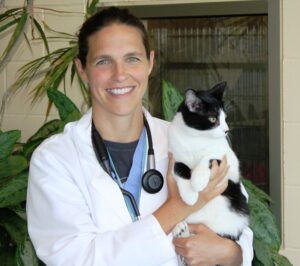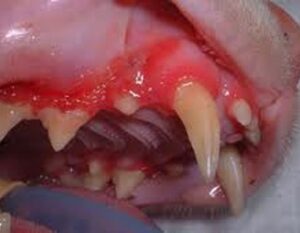-
Adopt
-
Veterinary Care
Services
Client Information
- What to Expect – Angell Boston
- Client Rights and Responsibilities
- Payments / Financial Assistance
- Pharmacy
- Client Policies
- Our Doctors
- Grief Support / Counseling
- Directions and Parking
- Helpful “How-to” Pet Care
Online Payments
Emergency: Boston
Emergency: Waltham
Poison Control Hotline
-
Programs & Resources
- Careers
-
Donate Now
 Kate O’Hara, DVM
Kate O’Hara, DVM
www.angell.org/generalmedicine
generalmedicine@angell.org
617-522-7282
In general, oral health and dentistry is a somewhat neglected or at least an under-emphasized aspect of veterinary medicine. Many of our patients do not receive the benefit of regular tooth brushing or routine dental cleanings, and we commonly see a variety of oral health issues such as periodontal disease, gingivitis, and missing teeth during physical examinations. However, sometimes we see a more extensive and painful inflammatory condition in the mouths of cats called feline stomatitis.
What is Feline Stomatitis and what are the symptoms?
Feline stomatitis has been known by many names and most recently as Feline Chronic Gingivostomatitis (FCGS). FCGS affects about 0.7-4% of cats, and is a very painful, often debilitating, chronic condition resulting from severe inflammation of the mouth tissues. Two forms of this condition are recognized based on the location of the inflammation in the mouth. The first form is marked by inflammation which starts in the gums and the tissues surrounding the teeth (the periodontum). The second form, called Caudal Stomatitis, involves an area at the back of the mouth where the upper and lower jaws come together known as the “fauces.” Caudal stomatitis may be more challenging to treat.
In FCGS, the affected areas in the mouth typically have a bright red appearance, bleed easily, and may have a “cobblestone” appearance. Cats with FCGS are very painful and often have difficulty chewing and eating. They may lose weight, have bad breath, drool or have oral bleeding, and may paw at their mouths. These cats may also have a scruffy coat as a result of decreased self-grooming and poor nutrition.
What Causes FCGS?
At this time, we do not know what causes some cats to develop FCGS, though viral and bacterial components, and inflammatory dental disease (periodontal disease and resorptive lesions) are thought to be involved. Whatever the trigger, it is generally believed that cats with FCGS have an altered immune state which permits and perpetuates the condition. Both inadequate and excessive immune responses have been implicated.
A disproportionate response by the cat’s immune system to plaque bacteria seems to play a significant role. An over-reaction to the plaque bacteria leads to an excessive inflammatory reaction which, without intervention, may progress to a more severe auto-immune condition in which the body also attacks the dental tissue itself. In addition to this, recent evidence supports a role for calicivirus (a virus that can affect a cat’s oral cavity) in the development of FCGS. Other viruses that can further affect a cat’s immune system, such as feline leukemia virus (FeLV) and feline immunodeficiency virus (FIV), have not been directly linked to the condition, but may play a role.
How is FCGS diagnosed?
There is no simple laboratory test to diagnose FCGS, though veterinarians may be suspicious for the condition based on a cat’s symptoms and an examination of the oral cavity. Certain systemic diseases and the more common gingivitis and periodontitis, however, can also cause oral inflammation that resembles FCGS, and should be ruled out. Complete baseline blood work should be run and can rule-out a variety of metabolic diseases. Screening for feline viral diseases such as FeLV and FIV should also be submitted. Dental x-rays are needed to evaluate for periodontal disease, tooth root resorption, or retained root remnants that may be inciting inflammation. Finally, if the inflammation is not widespread and is localized to a specific area, other diseases should be considered. Biopsy of the affected tissue should be collected to differentiate FCGS from oral cancer or localized infection.
How is FCGS treated?
A treatment plan for FCGS will vary depending on the stage and severity of the condition and a cat’s response in an individual case. Because there is no known specific cause for FCGS, there is also no specific treatment for the condition and all of these management techniques have been tried, often in combination, with variable results.
Regular dental care and medical management are typically the first line of treatment. Medical management is aimed at plaque control and modulation of the inflammatory/ immune response. A routine dental procedure should be performed to address any inflammatory dental disease, and a regular dental home-care program should be started. If the initial periodontal management is not enough, other medical therapies can also be tried.
As bacterial infection plays an important role in the development of FCGS and can complicate the condition, antibiotics are often prescribed. Unfortunately, the inflammation often returns once the antibiotics are stopped, and long-term use is not ideal.
Steroids can be used to reduce the inflammation in the mouth and provide some relief from the discomfort. However, steroids lose effectiveness over time for this condition, and significant side-effects with long-term use can be an issue.
Other therapies aimed at modulating and normalizing the immune system have also been tried including interferons, bovine lactoferrin, and esterified fatty acids. Stronger immunosuppressive medications have been used in the past, but have fallen out of favor.
There are many medical options that give partial or short-term control of FCGS. However, long-term results have been disappointing and many cats with FCGS cannot be controlled with medical therapy alone. In these cases, the next step is oral surgery for near full-mouth or complete dental extractions and excision of the excessive inflammatory tissue. The majority of cats (80% in one study) benefit from this therapy, but it is not a guaranteed cure and some cats will also need to continue on medical management as well.
FCGS can be a debilitating and potentially life-threatening condition in cats. It can be difficult to treat, but many cats respond well to a combination of routine dental care, medical management, and oral surgery and regain a good quality of life. Although some owners worry about removing all of a cat’s teeth, once the inflammation improves the cat will eat much more comfortably than it did with its teeth prior to the surgery. Hopefully, as more is learned about FCGS, better treatment options and even preventative measures will be discovered.
For information about Angell’s General Medicine service, please visit www.angell.org/generalmedicine or call 617-522-7282.
